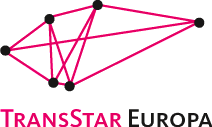Lucy Topol’ská
“In his article ‘About Translation,’ Valéry Larbaud says that translating is like a novel of love. Love – or spiritual affinity, harmony – elevates the poet to translate. However, the battle that comes right after it shows the other side of the coin. This is the battle, or struggle, of the translator with the original poet, with the original text – at various levels.”[1]
This battle is a well-known fact. However, the truth of this fact really only becomes clear when an inexperienced translator attempts to translate fiction into another language for the first time. An experienced instructor that is able to suppress his or her own translator’s ego and give the student free rein is an essential prerequisite; also important are the fun and joy achieved when translating. Lucy Topoľská’s translation seminars were always enjoyable and inspiring.
Lucy Topoľská was born in 1933 in Olomouc, Moravia (the eastern part of today’s Czech Republic), and she studied German and Russian in Olomouc and Prague. She received her bachelor’s degree in 1968 with a thesis on Thomas Mann. Since 1963 she has taught at the Department of German Studies in Olomouc, led lectures and seminars, supervised students’ essays and theses, and published on various topics involving Austrian, German-Jewish, and German Moravian literature. During the reversal of Dubček-era reforms (known as “normalization”), Topoľská’s publications were limited, like those of many other intellectuals that disagreed with the Communist regime. The Communist leaders also tried to make her academic life even more difficult. Nevertheless, she was allowed to continue teaching at the university after 1968 (unlike some of her colleagues) because she was not openly politically active in the Prague Spring. However, her interest in “Western philology” remained a thorn in the Communists’ side; she was not appointed a senior lecturer until 1988, after the situation in Communist Czechoslovakia had begun to change.
Nevertheless, the difficulties Topoľská had to deal with in her academic life during the Communist period increasingly oriented her toward literary translation. Before the Velvet Revolution of 1989, she translated Ödön von Horváth’s novel Jugend ohne Gott (Youth without God, published in English as The Age of the Fish), and her later publications in the 1990s included her translations of Paul Celan’s short story Gespräch im Gebirg (Conversation in the Mountains), Günter Grass’s Das Treffen in Telgte (The Meeting at Telgte), and Barbara Frischmuth’s novel Das Verschwinden des Schattens in der Sonne (The Shadow Disappears in the Sun).
Authors connected with Moravia are prominent in Topoľská’s translations. These authors have been studied and popularized since 1998, when the Research Center for German Moravian Literature was established at the Department of German Studies. Topoľská has been an important member of this research center since then. She has translated German Moravian authors such as Peter Härtling, who spent his early years in Olomouc during the Second World War. In addition to Härtling’s novels Herzwand (Heart Wall) and Hubert oder die Rückkehr nach Casablanca (Hubert, or the Return to Casablanca), which she translated into Czech, she has also translated some novels by the Swiss author Erica Pedretti, who grew up in Moravia.
Topoľská’s translation of Pedretti’s memoire Engste Heimat (Closest Homeland) earned her the Czech translating community’s Josef Jungmann Award in 1997, and three years later she received the Promotion Prize from the Robert Bosch Foundation.
Topoľská is currently translating German texts by contemporary authors (Bernhard Schlink, Julia Franck, and Martin Sutter), thereby contributing to improving cultural contacts between Germans and Czechs.
by Alžběta Peštová
[1] Topoľská, Lucy: Die Prager deutschen Dichter als Lyrik-Übersetzer. In: Lucy Topoľská & Ludvík Václavek (eds.), Beiträge zur deutschsprachigen Literatur in Tschechien. Olomouc: Vydavatelství univerzity Palackého, 2000, p. 215
Relying on the structure and methodology of classical and postclassical [...]
For further information on translation, the TransStar project and the [...]
Relying on the structure and methodology of classical and postclassical [...]
Sir or Madam, In co-operation with KulturKontakt Austria, the Austrian [...]
Five short films with translations (videopoetry) were made as part [...]
Translating Cube: Six Sides of European Literature and Translation Berlin, [...]
Programme (PDF)
Five short films with translations (videopoetry) were made as part [...]
Translating Cube: Six Sides of European Literature and Translation Berlin, [...]
Programme (PDF)
Translating Cube in Tübingen Reinold Hermanns: SWR2 Journal am Mittag, [...]
Being Exchanged: Between Paris, Stuttgart and Ivano-Frankivsk Yuri Andrukhovytsh, Lubomír [...]
Five short films with translations (videopoetry) were made as part [...]
Bookstore: http://www.edition-fototapeta.eu/geschichten-erzaehlen
More here (PDF). Bookstore: https://knjigarna.ff.uni-lj.si/si/izdelek/1623/pet-poti-do-prevoda/
Five short films with translations (videopoetry) were made as part [...]
Bookstore: http://www.edition-fototapeta.eu/geschichten-erzaehlen
More here (PDF). Bookstore: https://knjigarna.ff.uni-lj.si/si/izdelek/1623/pet-poti-do-prevoda/
Translating Cube: Six Sides of European Literature and Translation Berlin, [...]
Programme (PDF)


